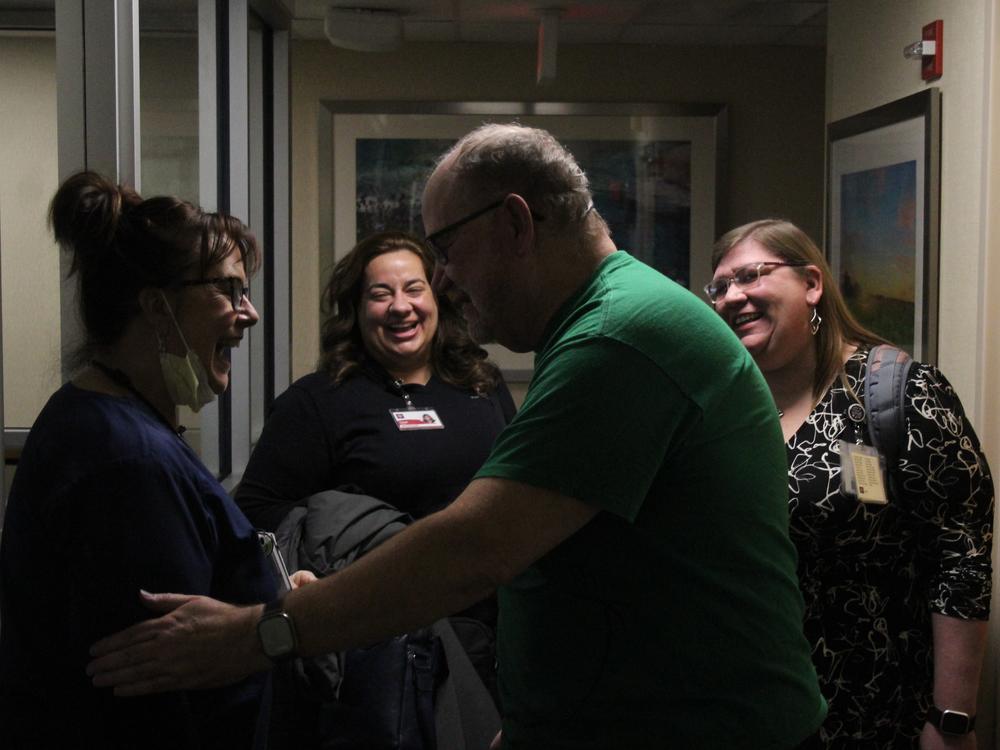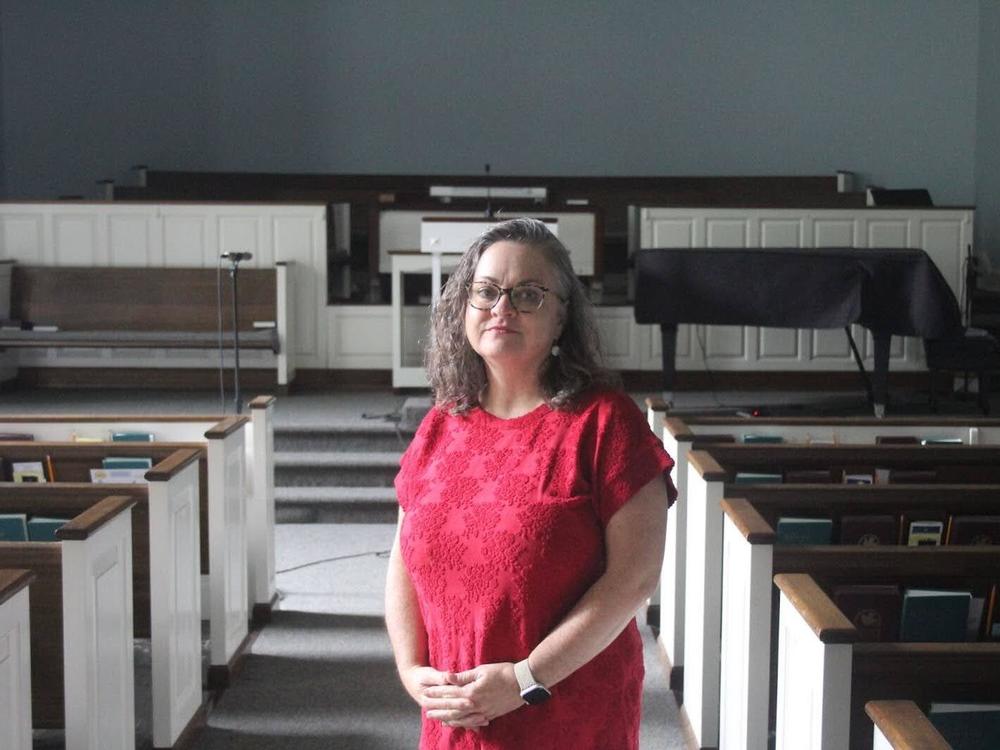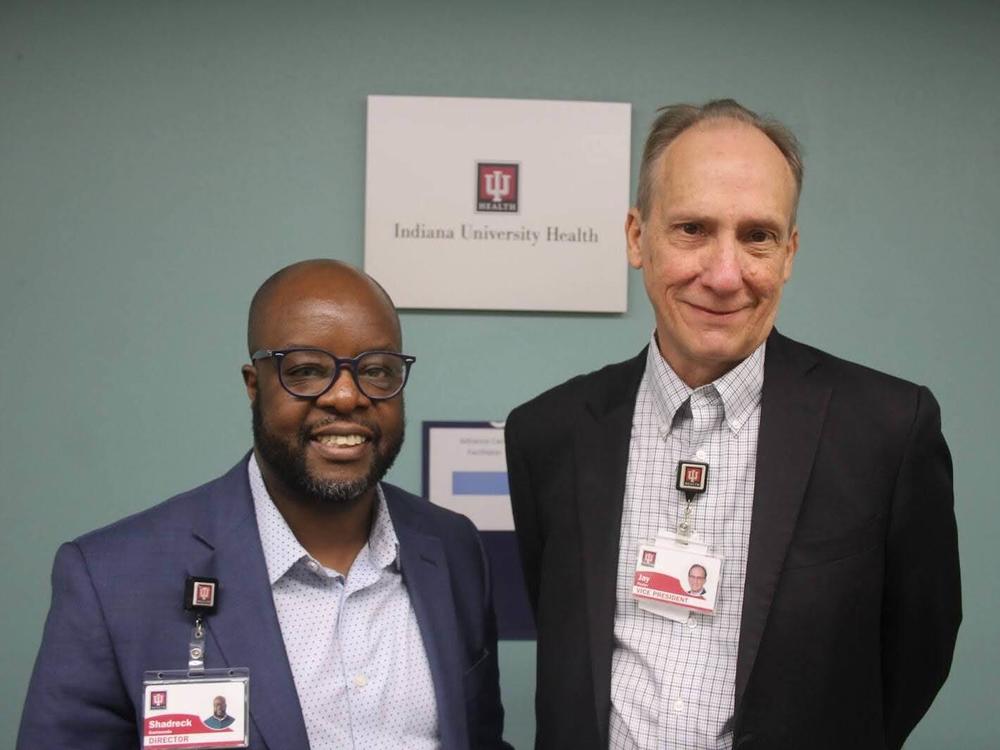Section Branding
Header Content
Why some doctors have started asking patients about their spiritual lives
Primary Content
When you think about your health, you probably think about whether you've been getting enough exercise, what your diet looks like, or whether you remembered to take your medication this morning.
But some hospitals have begun to embrace programs targeted at spiritual support in addition to physical care. Those programs are supported by a growing body of research on the health benefits of spiritual practice.
One of those programs is out of the Indiana University Health system, which connects patients being discharged from the hospital with individuals called "connectors," if the patient doesn't have a community support network of their own.
Timothy Moss was connected to the program after struggling with feelings of extreme loneliness. At 59 he was forced to retire from his job teaching gifted students at a school in Terre Haute, Indiana, because of health complications.
Moss becomes emotional when speaking about that change in his life.
"I had to retire early, so I had to quit teaching, and that was the love of my life," he said. "I loved it. That was my hobby. It was all my friendships."
Moss struggles with a variety of physical ailments including diabetes, neuropathy, heart problems, and vision issues. Those problems forced him to retire, particularly as it became too difficult for him to read aloud to his students.
Moss, who said he spent much of his life at the school, found himself cut off from that world and the teachers he had been close to.
"I lost my social group, and you know, they're all busy working and doing things," he said. "And so it was just a new chapter where my life just changed abruptly."
More recently, Moss' brother passed, further cutting him off from social connections.
"When you're in your senior years, you're kind of forgotten, you know, because things change in your life, and you feel like, oh my gosh, yeah, You don't have the purpose you used to have," he said.
A new health model
After Moss' struggles were identified by his doctor, he was connected to a unique program within the Indiana University Health system called the Congregational Care Network. That program pairs patients with members of local faith groups who spend time with patients over a 12-week period.
"Patients will say the most important part of their health journey is their provider, and second is their faith," said Jay Foster, Vice President of Spiritual Care at IU.
Foster pointed to a recent report from the McKinsey Health Institute which found that "meaning in one's life" was associated with strong mental, physical, and social health.
"There's a positive correlation between those who say that spirituality is important for them and overall good health," he said. "It's not just a nice add-on to help the question of health. It's consequential to health."
IU's program begins with a doctor asking patients a series of "spiritual assessment" questions aimed to identify if they need something beyond their immediate physical care.
"All human beings have a need for meaning and purpose," Foster said. "When someone has an illness, that sense of meaning and purpose is impinged upon, and having a thoughtful conversation partner can help people cope with that illness."
To get that conversation started, doctors will ask a range of questions from "How lonely are you?" to "Is your faith an important resource in times of illness?"
Foster is quick to explain that spirituality isn't exclusive to religious groups — but religious groups often have built-in social networks that individuals and healthcare systems can tap into for help.
"With the ultimate goal of helping individuals find a community that's meaningful for them," he said. "So that they are not only a patient, but as a member of the community, they are not just receiving care they are actually contributing."
While most hospitals across the U.S. have chaplaincy programs and interact with local religious congregations in some way, supporters of this new approach said just a few hospital systems are doing that kind of in-depth work.
Many hospitals provide health education through religious communities, but the Congregational Care Network's model leans on parishes to help provide individuals with care and support, Foster said.
A Quaker connector
One of the churches working with the IU Health system is Indianapolis First Friends, a Quaker meeting.
Kathy Rhyne is a member who connected through the hospital with a woman in palliative care.
"We talked about everything our entire lives, and have just become fast friends," Rhyne said. "And now she calls me and I call her, and we're like sisters."
Rhyne comes from a different faith tradition than the patient she connects with, who was raised Jewish. But to Rhyne, those differences don't matter.
"For the Quakers, all are welcome, and it's really important," she said. "I think the more we reach out, the better the opportunity that someone [will] find a community and feel loved and feel cared for."
Ryne's relationship with her patient extended beyond the initial 12 weeks allotted for the program. She said once they grew close, it felt like there was no reason to stop talking. It's an experience administrators of the program say is not uncommon.
"I think her just knowing that there's someone that she could call...if she were afraid, meant the world," Rhyne said. "Means the world. Means the world to me and means the world to her, and it goes both ways."
Can this program spread?
Health experts say the IU Health program is part of an effort to better integrate so-called spiritual care into patient care for people struggling with illness or loneliness. And it starts at the hospital.
Daniel Sulmasy is the Director of the Kennedy School of Ethics at Georgetown University. He said asking about a patient's spirituality can be uncomfortable.
"We've been able to overcome taboos and talk about patients, sexual activities, their drug use, but somehow we've not been able to ask them about their own spiritual beliefs and practices that can really impact their own care," he said.
Sulmasy said programs like the one at IU are still rare, but may represent early efforts to bring spiritual care or, as he describes it, "whole person care" back into the doctor's office.
There are signs these conversations are being had.
At the most recent annual meeting of the American Medical Association, delegates passed a resolution both promoting medical education on spiritual health and supporting patient access to spiritual care services.
Sulmasy said there is still some hesitancy from physicians to ask patients questions about spiritual needs.
"I don't want to advocate that physicians should become the spiritual friend of their patients or to become the patient's chaplain, but quite often they might be the only people who really ask the question," he said.
Skeptics argue that programs like the one at Indiana University Health require investment in preventative care not normally supported by hospital systems.
"We put the money into acute and specialty care, because that's what makes the money," said David Craig, a professor of religious studies at Indiana University Indianapolis.
Craig said the faith-based approach is similar to preventative care — something hospitals have not traditionally invested as heavily in. He said long-term partnerships between faith groups and hospital systems will require serious investment.
"It's very hard to do because you need professional staff, people in anchor institutions to help connect people to those resources," he said.
But advocates say integrating spiritual questions increases patient satisfaction with their healthcare experience.
Timothy Moss, after speaking with his doctor about the program, was paired with a member of a Methodist Church in Bloomington, some sixty miles away.
The retired teacher said he still struggles with his overall health and hasn't been improving the way he's wanted it to. But the conversations with his connector, Janet, have helped him manage.
"What I found is, you know, times when I'm talking with Janet, and she's helping me through things that I'm trying to manage, along with my health issues. It's just nice to have someone to be able to discuss and share with."
Like connector Kathy Rhyne, Moss, said his time in the program with Janet has already gone for the required twelve weeks.
But, he said, they're still talking on a regular basis.
This story comes from Side Effects Public Media, a health reporting collaboration based at WFYI in Indianapolis. We partner with NPR stations across the Midwest and surrounding areas — including KBIA and KCUR in Missouri, Iowa Public Radio, Ideastream in Ohio and WFPL in Kentucky.




